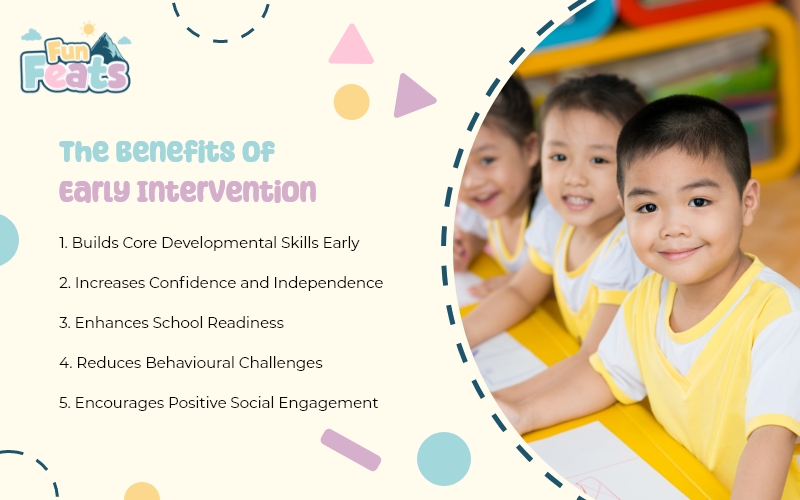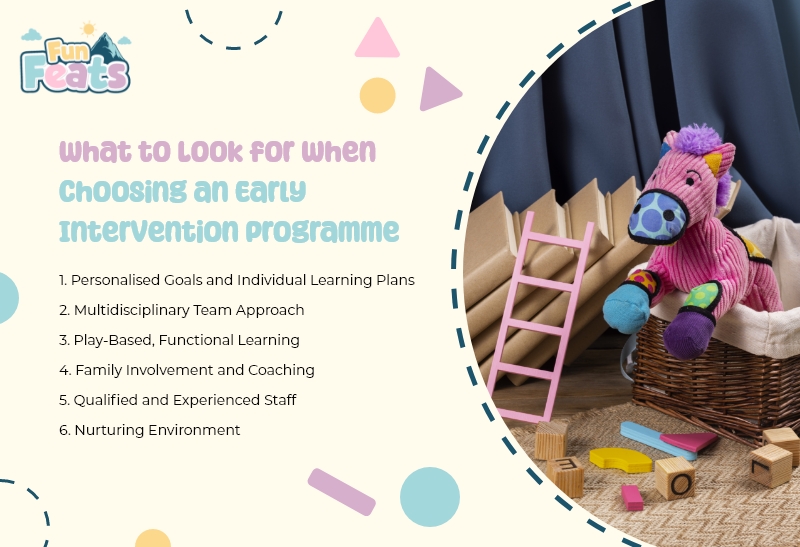
As parents, we all hope our children will grow, learn, and thrive in their own time. But what happens when development doesn’t follow the typical timeline—when your child struggles with speech, movement, focus, or daily routines?
Feeling unsure is completely normal, but remember—you’re not in this alone. An Early Intervention Programme (EIP ) can provide children with the developmental support they need during these crucial stages, all while giving parents the clarity and confidence they need.
In this article, we’ll unpack the importance of early intervention, explore its benefits for both children and families, and help you understand what to expect from a well-rounded programme.
Key Takeaways
- The importance of early intervention lies in identifying and addressing developmental delays or challenges as early as possible, helping children build a strong foundation for lifelong learning.
- Early intervention programmes focus on holistic, individualised plans that target speech, motor skills, social engagement, and emotional regulation.
- A high-quality programme should have personalised goals, a multidisciplinary team, play-based activities, qualified staff, and a nurturing environment. They should also prioritise parent support and involvement for child development.
- Transitioning to mainstream classrooms is smoother when early intervention is integrated with after-school programmes, bridging gaps and fostering independence.
Understanding the Importance of Early Intervention
Who is Early Intervention For?

Early intervention refers to specialised support and therapy services provided to infants and young children who show early signs of developmental delay or have been diagnosed with a condition. It is typically recommended for:
1. Children with Observable Delays
Some children may not be formally diagnosed but show differences in how they grow and learn. They may experience:
- Speech and Language Delays: Your child may not be babbling or speaking as much as other children their age. They might struggle to form words or sentences or have trouble understanding simple instructions.
- Motor Delays: Children who face challenges with crawling, walking, using cutlery, or manipulating toys may need support. These difficulties can affect both fine motor skills (like grasping small objects) and gross motor skills (like balancing and walking).
- Difficulties with Social Interaction: Some children might seem withdrawn, make limited eye contact, or show little interest in playing with peers. They might also face difficulties responding to others or joining in with group activities.
- Daily Living Skills: If your child has trouble with everyday routines like feeding, dressing, or using the toilet, these could be early signs of developmental delay. These skills are crucial for independence and success at home and in school.
- Behavioural Concerns: Some children may have frequent meltdowns, seem rigid in their routines, or find it hard to transition from one activity to another. These behaviours can be signs that your child needs extra support to feel comfortable and secure.
The importance of early intervention cannot be overstated, providing child developmental support even before a formal diagnosis is made. It’s about giving your child every chance to develop the skills they need while you seek further assessments with a registered paediatrician or developmental specialist in Singapore.
2. Children with Diagnosed Disabilities
For children who have already been assessed and diagnosed with a specific condition, the importance of early intervention becomes even clearer. In these cases, early support helps your child build confidence, learn new skills, and participate more fully in daily life.
Common conditions that can benefit from early intervention include:
- Autism Spectrum Disorder (ASD): Children on the spectrum may have differences in social communication, sensory processing, and how they handle change. Research has consistently highlighted the importance of early intervention for children with ASD, demonstrating how targeted support can significantly improve social outcomes.
- Attention-Deficit/Hyperactivity Disorder (ADHD): Children with ADHD often find it hard to focus, control impulses, or manage their emotions. Early support can help them develop strategies for attention and self-regulation, building a strong foundation for school readiness skills.
- Neurological or Genetic Conditions: Conditions like Down syndrome, cerebral palsy, or rare genetic disorders can affect physical development, learning pace, and how children engage with the world. Early intervention offers practical, personalised support to help these children build independence, confidence, and social skills.
In these cases, the importance of early intervention is even more pronounced, creating an environment where every child, no matter their challenges, has the chance to thrive.
How Children Benefit from Early Intervention

1. Builds Core Developmental Skills Early
An early childhood intervention programme addresses crucial skills like speech and language, motor coordination, social interaction, and emotional regulation. For instance, children with speech and language delays can build stronger language skills through specialised speech and language therapy. On the other hand, those with motor delays strengthen their muscles and coordination through targeted play-based exercises. By working on these core areas early, children are better prepared to explore, learn, and engage with the world around them, developing key skills that last a lifetime.
2. Increases Confidence and Independence
When children develop new abilities—like using words to ask for help, managing routines, or trying new activities—they experience the excitement of achieving something on their own. This sense of accomplishment builds their confidence and strengthens their independence. For example, a child who learns to dress themselves or follow classroom routines feels proud and capable, which can boost their willingness to try new things. This encourages them to embrace new challenges and engage more fully in both family life and school activities.
3. Enhances School Readiness
The importance of early intervention lies in how it prepares children for structured learning environments. Through fun, purposeful activities, children practise core school readiness skills like listening to instructions, taking turns, and sitting for short periods. This makes transitions into mainstream or special education smoother and more positive, setting them up for future success in the classroom.
4. Reduces Behavioural Challenges
Many behavioural challenges arise because children are struggling with skills they haven’t yet mastered. Meltdowns, rigid routines, and difficulties transitioning between tasks often stem from frustration or communication barriers. A therapy programme for children addresses these underlying issues by teaching them new ways to communicate, self-regulate, and engage. As a result, children become calmer, more focused, and more adaptable—both at home and in school.
5. Encourages Positive Social Engagement
Social skills like sharing, turn-taking, and playing cooperatively are essential for forming friendships and thriving in group settings. With early childhood intervention programmes, children learn these skills in a supportive, structured environment. They learn how to work with peers, read social signals, and form connections—creating a sense of belonging and community.
These benefits highlight the importance of early intervention in nurturing every aspect of a child’s growth. Through engaging, play-based activities, children aren’t just learning individual skills in isolation—they’re building a strong, interconnected foundation for success in school, friendships, and everyday life.
A Complete Guide to Early Intervention Programmes

Choosing the right early childhood intervention programme can feel overwhelming, especially when faced with so many options and concerns about your child’s unique needs. But understanding what a truly comprehensive, holistic approach looks like—and recognising the importance of early intervention in fostering school readiness—can make all the difference in finding the right support.
Key Components of a High-Quality Early Intervention Programme

A high-quality early intervention programme focuses on supporting the whole child. Whether you’re considering a government-funded facility or a private EIPIC centre, make sure to look out for:
1. Personalised Goals and Individual Learning Plans
The importance of early intervention lies in its personalised approach. Each programme begins with a detailed assessment to understand your child’s current skills and challenges. This process may also include standardised developmental screening tools, caregiver interviews, and clinical observations to gain a clear understanding of each child’s developmental profile. From there, therapists and educators collaborate to craft a tailored intervention plan that aligns with your child’s unique needs and family priorities.
2. Multidisciplinary Team Approach
A strong therapy programme should bring together a team of professionals who work in harmony to address your child’s developmental needs holistically:
- Occupational therapists: Focus on helping children with sensory processing, fine and gross motor skills, and everyday tasks like dressing or eating.
- Speech-language therapists: Support the development of communication skills, including speaking, listening, and understanding language.
- Early childhood educators or learning support teachers: Use engaging activities to build learning habits and social-emotional skills.
This collaborative, multidisciplinary model ensures that your child receives consistent support across every aspect of their growth.
3. Play-Based, Functional Learning
A good EIP centre should understand that play is a child’s natural way of learning. Activities in the program are designed to be developmentally appropriate, engaging, and fun—whether it’s stacking blocks to improve motor coordination, singing songs to encourage speech, or engaging in pretend play to foster social skills. This approach makes learning feel safe and enjoyable, motivating children to participate and explore.
4. Family Involvement and Coaching
The importance of early intervention extends beyond the therapy room—it includes empowering both parents and caregivers alike. A good programme should actively involve families through regular updates, coaching sessions, and home-based activity suggestions. When parents understand the goals and strategies used in sessions, they can reinforce progress at home, creating a consistent and supportive environment for their child’s growth.
5. Qualified and Experienced Staff
Quality matters. Look for early intervention centres where staff are trained in child development and have experience working with children who have diverse needs, including those with early signs of developmental delay or diagnosed conditions. At FunFeats, for example, our therapists hold recognised degrees in occupational therapy from renowned schools in Singapore, Dublin, and Australia.They are also fully licensed and trained in proven therapeutic practices, ensuring your child receives the highest standards of care.
In addition to our therapists, our teachers are specially trained in special needs education and early childhood teaching, equipping them to create a nurturing and inclusive learning environment tailored to each child’s unique developmental journey.
6. Environment and Fit
Take the time to visit different centres and see how they interact with children. The right environment should feel safe, structured, and engaging—fostering a sense of trust and joy in learning. Look for spaces that are well-organised, filled with developmentally appropriate materials, and where children feel welcomed and encouraged to explore at their own pace.
Helping Children Transition to Mainstream Classrooms

The importance of early intervention is especially evident for children who are preparing to enter mainstream education. These therapy programmes ensure that children can carry over essential skills like social engagement, communication, and self-regulation into their daily school experiences, making the transition smoother and more successful.
1. Bridging the Gap Between Therapy and School
Structured therapy sessions and the bustling environment of a mainstream classroom can be very different. To help streamline the transition, therapists work on targeted skills like following group instructions, coping with distractions, and managing peer interactions—qualities that will be crucial when adapting to busy classrooms and dynamic social settings. This real-world application reinforces the importance of early intervention in helping children to feel secure and capable in a new learning environment.
2. After-School or Weekend Sessions
To complement the learning that happens in school, many EIPIC centres in Singapore offer flexible after-school enrichment programmes or weekend therapy sessions tailored to your child’s specific needs. FunFeats, for instance, offers academic and homework support as well as daily living skills and independence training. Social and behavioural coaching is also essential for helping children navigate peer interactions, build resilience, and manage frustration. These sessions ensure that progress made during school hours is reinforced and expanded upon—fostering well-rounded growth in both academic and everyday life skills.
3. Aligning Goals with Teachers and Schools
Some centres even work directly with your child’s teachers and learning support staff (with your consent). By sharing goals and progress updates, they create a unified approach that helps your child feel more confident and capable at school. At FunFeats, we provide occupational, speech, and educational therapy add-ons to align with your child’s Individualised Education Plan (IEP), ensuring that every strategy is seamlessly integrated into your child’s daily routine. This coordinated effort bolsters the importance of early intervention by fostering consistency and maximising progress.
Frequently Asked Questions
1. Will early intervention delay or interfere with my child attending mainstream preschool or school?
Not at all! In fact, many parents may not be fully aware of the importance of early intervention in preparing their children for the structured environment of mainstream preschool or school. These programmes are designed to work alongside typical school routines, helping children develop the foundational skills they need to participate confidently and independently.
2. What’s the difference between therapy and early intervention?
Therapy typically focuses on specific areas (like speech or motor skills), while early intervention is a holistic programme that combines multiple approaches—therapy, education, and social-emotional support—under one coordinated plan. This reflects the importance of early intervention in supporting the child in all aspects of their development.
3. What happens after my child completes the early intervention programme?
When a child is ready to graduate, the team will usually work with parents to plan for the next stage, whether that’s full integration into mainstream school, support in a learning support programme, or continuing therapy. Some children transition smoothly, while others may still benefit from periodic support, such as after-school programmes, depending on their needs.

